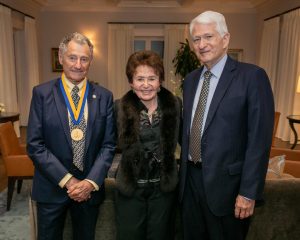
Leonard Kleinrock, distinguished professor of computer science and one of the world’s foremost internet pioneers, was awarded the UCLA Medal, the campus’s highest honor, for his remarkable contributions in providing the intellectual foundation for the modern technical age.
The medal is given to those with exceptionally distinguished academic and professional achievement and whose bodies of work or contributions to society illustrate the highest ideals of UCLA. Presidents Bill Clinton and Jimmy Carter, Los Angeles Mayor Tom Bradley, UCLA alumna and former astronaut Dr. Anna Lee Fisher and basketball coaching legend John Wooden have been among the recipients.
Kleinrock’s enduring curiosity of how one could best apply scientific principles to design and build structures was first spurred as a young boy when he built a crystal radio from a description in a Superman comic. His fascination with electronics led him to attend The City College of New York and earn a degree in electrical engineering entirely at night. He went on to earn master’s and doctorate degrees in electrical engineering from MIT.
In 1962, as a graduate student, Kleinrock developed the mathematical theory of packet-switching, the technology that underpins the internet. A year later, he joined the faculty at UCLA where his efforts have benefited the public well beyond the demands of academic tradition.
At UCLA, Kleinrock’s mathematical theory was put into practice on the Defense Advanced Research Projects Agency’s fledgling Arpanet network, the precursor to today’s internet.
As a result of his theoretical understanding of computer networks, Kleinrock was appointed principal investigator of the UCLA Arpanet project and received the first Interface Message Processor — a router the size of a large refrigerator — at his lab at 3420 Boelter Hall, where it remains today. His SDS Sigma 7 host computer became the first node on the Arpanet in September 1969, and he directed the transmission of the first internet message from UCLA to the Stanford Research Institute on Oct. 29, 1969.
“Len is a treasured and enthusiastic member of UCLA’s faculty. His extraordinary work that helped lay the foundation for today’s internet is a tremendous point of pride for our campus,” said UCLA Chancellor Gene Block. “The entire UCLA community has been made better by Len’s intellectual rigor and leadership.”
Kleinrock has received eight honorary degrees, published more than 250 papers, and authored six books on packet-switching networks, broadband networks, performance evaluation, wireless network technology and peer-to-peer networks that have helped advance the fields of engineering and computer science.
“Thanks to Len, UCLA became the birthplace of the internet,” said Jayathi Murthy, the Ronald and Valerie Sugar Dean of UCLA Samueli School of Engineering. “His brilliant research, service and teaching have truly benefited our faculty, students, alumni and the entire engineering community.”
On the 50th anniversary of the internet, Kleinrock was presented the key to the City of Los Angeles from Mayor Eric Garcetti, the fourth recipient of such an honor during the Garcetti administration.
Among Kleinrock’s additional accolades are the 2007 National Medal of Science, the highest honor for achievement in science bestowed by the president of the United States, the L.M. Ericsson Prize, the Marconi Prize, the Okawa Prize, the NAE Charles Stark Draper Prize and the BBVA Frontiers of Knowledge Award. He is also a member of the National Academy of Engineering, the American Academy of Arts and Sciences, the National Academy of Inventors and an inaugural member of the Internet Hall of Fame.
